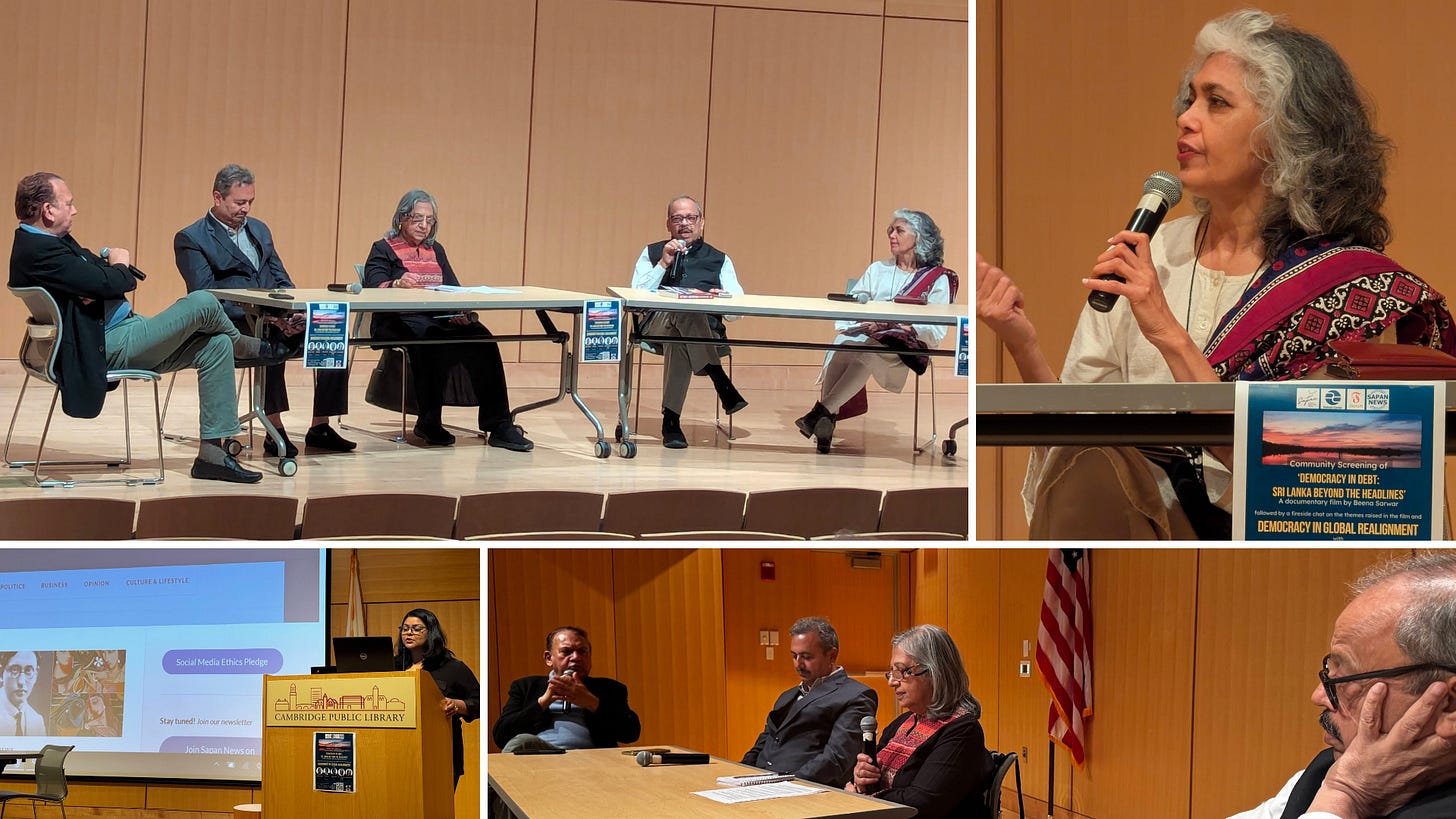Peace = resistance: Amid rising tensions in Southasia, a call for restraint
As India-Pakistan relations nosedive, remember: It is people who pay the price of conflict. In this edition: An SRK fan moment, 'Democracy in Debt' screenings, art, music, a healing 'SAPNA', and more
Dear Sapan family,
As war rhetoric escalates and human tragedy casts its long shadow, we at Southasia Peace Action Network (Sapan) stand firm in our belief that peace is not the absence of conflict, but the presence of courage, dialogue, and resolve.
From Pahalgam to Punjab, from Cambridge to Kathmandu, our voices — diverse, determined, and cross-border — rise not in anger, but in unity. We claim no easy answers. But we offer an urgent clarity: Violence is not destiny, and peace must be pursued — loudly, relentlessly, together.
Read our urgent plea to India and Pakistan to ‘stop the war’ immediately, which got a great response, though one feedback was that it’s “not a war”. So our subsequent online petition pleads with the two countries to stop hostilities — more than 2,500 signatures in less than 24-hours. Let’s keep it going. Let’s reach millions.
The pain of the Pahalgam tragedy — and the dangerous rhetoric that has followed — is spiralling into an abyss from which return would be unimaginable. As nuclear-armed neighbours beat their drums, media houses and social media trolls pour gasoline on fires, throwing up smokescreens that hide the humanity on ‘the other side’.
Read Swarna Rajagopalan’s powerful article on the urgent need for restraint. A Sapan News syndicated feature available to republish with due credit.
We stand firmly with all those condemning extremism in any form, and against the targeting of civilians on any pretext. We reject communal frenzy and weaponised rhetoric that seeks to justify vengeance over vision.
We call on:
Journalists and digital influencers to hold their platforms with care, not let them become battlegrounds (Endorse the Social Media Ethics Pledge).
Governments of India and Pakistan to act not as adversaries, but as stewards of fragile peace.
Ordinary citizens to demand accountability, resist war hysteria, and advocate for co-existence.
Let us remember: In the game of war, it is the people who pay the price.
Shah Rukh Khan’s pre-conflict Met Gala appearance
Hours before conflict broke out between India and Pakistan, overseas fans from both countries stood in the pouring rain outside Shah Rukh Khan’s hotel on Mahattan’s Upper West Side hoping to catch a mere glimpse of ‘King Khan’.
Sapan News volunteer Contributing Editor Saman Shafiq managed to not only see SRK but also “got in a little wave in a moment that cannot be expressed in words.” She’s still savouring that moment even as she processes news of the conflict from her family in Lahore.
Read her report on the event for USA Today, where she works.
bal community screenings: Democracy in Debt: Sri Lanka Beyond the Headlines
Cambridge Public Library, May 5: The lights dimmed, the screen flickered to life—and for 25 minutes, voices from Sri Lanka filled the room. What followed was more than a panel—it was a collective reckoning.
A fireside chat between filmmaker and Sapan co-founder Beena Sarwar, feminist activist Hayat Imam, and journalists Anand Vardhan Singh, Sheetal P. Singh, and Satish Jha from The Public India. The discussion unpacked not just Sri Lanka’s economic and political debt, but its emotional and moral reckonings, resonating universally.
Lynchburg VA, April 30: Randolph College President Sue Ott Rowland hosted a special screening of Democracy in Debt: Sri Lanka Beyond the Headlines for faculty and students heading to Sri Lanka on a research trip. Dancer-scholar Dr. Sudesh Mantillake, visiting faculty at Randolph, whose research in Kandyan dance explores art as decolonising practice, facilitated the post-screening discussion with Beena Sarwar and the audience.
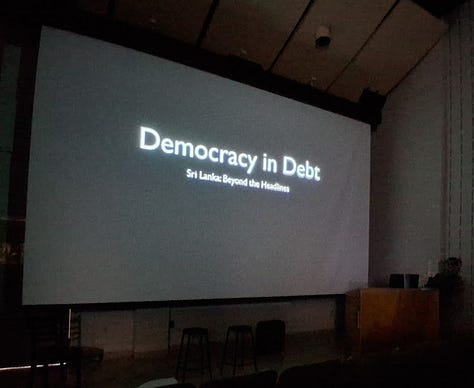
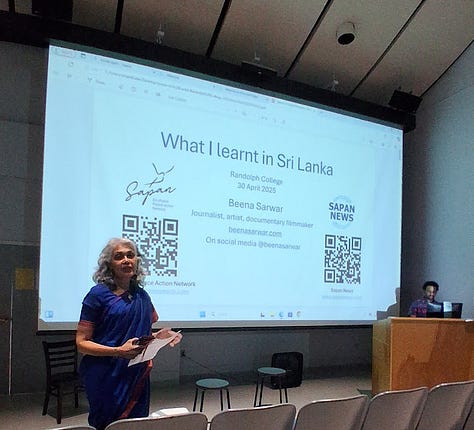

Sapan fourth anniversary webinar: Amid war clouds, a solemn reaffirmation
As war clouds gathered over the region, the Sapan fourth anniversary online event on the last Sunday of April became a solemn reaffirmation rather than a celebration. We began with silence for the victims of the Pahalgam tragedy. Silence soon gave way to powerful words.
From Bangladeshi lawyer Sara Hossain, who spoke of holding on to justice in politically uncomfortable spaces, to Pakistani environmentalist Rafay Alam, who warned of climate catastrophe as a borderless civilizational threat, and Indian activist Lalita Ramdas, who linked her childhood in Kashmir with the present violence — each voice reminded us: Peace is not a luxury. It is survival.
Even a cyber-attack couldn’t derail the dialogue.
“It only strengthens us,” said former senator Farhatullah Babar in Islamabad, lauding Sapan’s resilience. “Peace-building is resistance.”
Closing the session, Nepali journalist Namrata Sharma left us with a vision: “Let us dream — of a nuclear-free, demilitarised Southasia. As Benazir Bhutto said, everyone has a right to dream. And we must dream together.”
Read my report on the discussion, a Sapan News syndicated feature. Watch the recording here.
Sapan Spotlight #2 | In conversation with Lalita Ramdas
Instagram Live, April 26: A day before the anniversary event, we paused for a quieter moment.
Aspiring journalist and Sapan volunteer Anusha Dwivedi in Delhi spoke to educator, activist, and Sapan founding member Lalita Ramdas in Hyderabad, India, for an Instagram Live. Their conversation peeled back layers of history, memory, and the deep personal roots of Ramdas’s peace activism.
“We need to reimagine security not as weapons,” said Lalita Ramdas, “but as the freedom to walk across borders with dignity.”
📺 Link to the full conversation here
Breaking the cycle of intergenerational trauma with SAPNA
Cambridge MA, May 3: Last Saturday, the Stata Center at MIT became a space not just for learning, but for healing. A groundbreaking event hosted by SAPNA (South Asian Psychology and Neuroscience Association), a new organisation co-founded by educator and entrepreneur Imran Sayeed and pharmacist Neha Katyal, both recent Sapaners, brought together global scholars, psychologists, and community members to explore a deeply resonant theme: Intergenerational trauma in immigrant and minority communities.
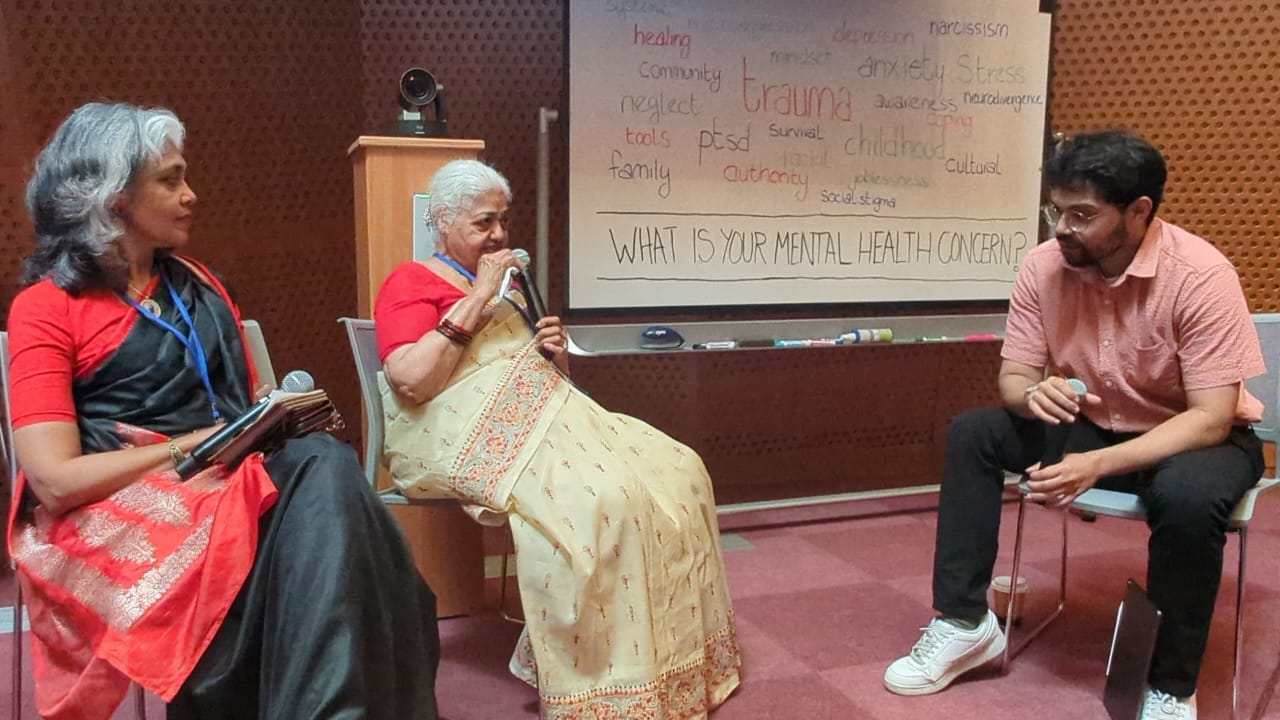
Musical fundraiser for marginalised communities in India
Framingham MA, May 3: Joy and rhythm took center stage at Savera, a unique musical event featuring talented singers from around New England. Hosted by Karachi-born Sapaner Siraj Khan, former President of the Pakistan Association of Greater Boston, the concert supported Snehalaya, a grassroots nonprofit working with marginalised communities in India. How’s that for cross-border cooperation?
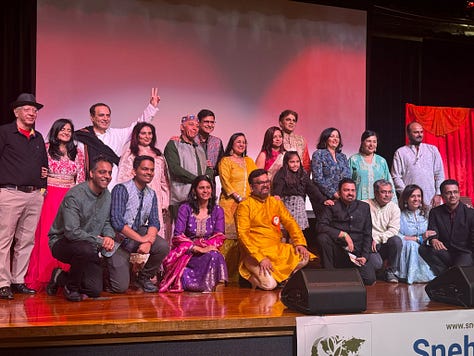
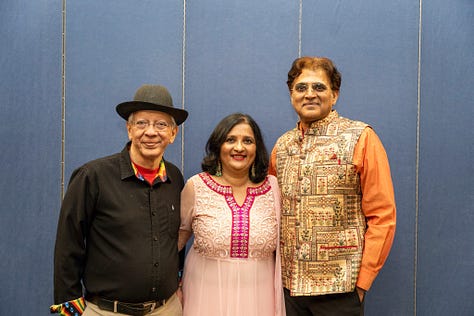
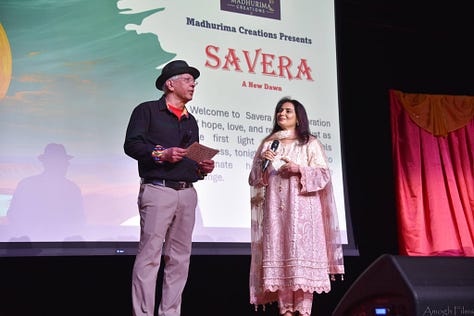
Upcoming event | Seat 1C: A Conversation with Zafar Masud
LAHORE: May 9, 2025 | 4:00 p.m. @ LUMS (Lahore University of Management) Sciences
Banker, survivor, and storyteller Zafar Masud, one of only two survivors of the PK8303 plane crash, will share his remarkable story—a journey now captured in his memoir Seat 1C.
Ongoing event in London: Young Southasian Artists at SOAS
If you’re in London, don’t miss (Un)Layering the Future Past of South Asia: Young Artists’ Voices, an exhibition showcasing 26 emerging artists from across Southasia! Co-curated by Sapan founding member and advisor Salima Hashmi and Sapaner Manmeet K K. Walia. At SOAS Gallery, April 11-June 21.
Endnote
From pain to healing, from story to song, the events shared above remind us that Southasian resilience takes many forms. And when we come together, the threads of trauma can be rewoven into tapestries of hope.
Amplifying Sapaners: Share your achievements & initiatives
Have you or someone you know in the Sapan community done or achieved something that promotes understanding or cross-border dialogue? We want to hear from you!
Sapan-3000 fundraising campaign
Here’s a thought: If 3,000 supporters pledge $50 annually for five years, Sapan News can sustain its mission of delivering independent journalism across Southasia and the diaspora. Donate tax-free via the Sapan Foundation Inc., a 501 (c) (3) org. EIN 93-3105901.
In solidarity and hope,
Team Sapan
Newsletter compiled by Pragyan Srivastava, Associate Editor, Sapan News
Journalist | Former Fulbright-Nehru Scholar, Rutgers University
Why 'Southasia' as one word?
Because our histories entangle, our struggles intersect, and our futures are bound together. It is not just a spelling choice—it’s a political and poetic one.
Until next time, stay safe, stay kind, stay connected.
Email us: southasiapeaceactionnetwork@gmail.com







